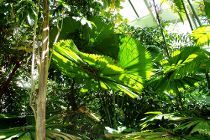Threat to rainforests from climate change “greater than suspected”
The Met Office has warned that deforestation has increased the risk of drought in tropical rainforests.

The Met Office has warned that deforestation has increased the risk of drought in tropical rainforests.
In its latest climate change review, the Met Office's Hadley Centre warned that the risk of tropical rainforests succumbing to drought due to climate change, and growing methane emissions from melting permafrost, is greater than suspected.
The Met Office's report looked at international peer-reviewed science over the last three years, and remodelled the data by inputting it on a more powerful computer. The research will feed into the Intergovernmental Panel on Climate Change's assessment in 2013.
The review also suggested that by the latter part of this century the Arctic may become extensively ice-free in summer, because it is melting faster than expected.
"The evidence of the dangerous impact of climate change is clearer than ever," said Vicky Pope, Head of Hadley's Climate Predictions Programme, speaking to The Guardian today. "New understanding of the science suggests the overall impact will be about the same [but] in some cases, like the risk of methane release from wetlands and permafrost melting, [we] now conclude that the risks are greater."
The UK government-run climatology centre also ruled out the chances of northern Europe facing a new ice age, or of catastrophic sea-level rises of almost four metres that would engulf the planet.
The evidence suggested that the risk of the Atlantic conveyor ocean current, which warms northern Europe, slowing and forcing down temperatures in the region wasn't as great as first feared. "The risks are not as great as we thought before." said Pope.
However, the report stressed that the Greenland and west Antarctic icesheets may not be able to recover once the ice had melted. The research did suggest that if the icesheet collapsed it was unlikely to be catastrophic, because losses would occur at different speeds.
The worst case scenario –a four-metre rise in sea level – was virtually ruled out in the next century, but 20cm to 60cm rises were seen as likely. The report stated that the rise will not be the same everywhere, and acknowledged there was a lack of understanding about the potential regional effects of a rise in sea-levels.
Among other assessments in the report were that old-growth forests, which were thought to be carbon neutral, are now known to still absorb CO2. There was also new evidence that they are more susceptible to drought than expected, and that tropical deforestation can accelerate climate change. There was also evidence emerging of increasing emissions of methane, a powerful, but short-lived, gas from wetlands.
The previous climate change review was in March 2010, and amongst its observations were that oceans over the last 50 years had gotten warmer, sea-ice is declining at a rate of 600.000km2 per decade and that there has been a small increase in Antarctic sea ice since 1978. All these trends can be explained, according to the review, by man-made global warming.
Author: Leroy Robinson | Climate Action
Image: amandabhslater | Flickr






